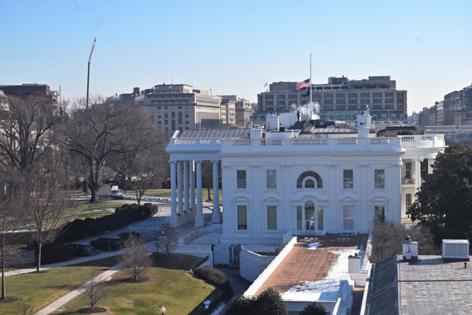Fate unclear for White House environmental quality office
Published in Science & Technology News
WASHINGTON — The future of the White House Council on Environmental Quality is murky after a court decision and executive order vacated its decades-old authority to issue environmental regulations.
The CEQ implements the National Environmental Policy Act across the federal government, coordinating environmental reviews and permitting for major infrastructure projects such as highways and pipelines, while acting as an adviser to the president.
When NEPA established the small White House office in 1970 it didn’t have the explicit authority to issue regulations. It only gained that power under a 1977 executive order issued by President Jimmy Carter.
Now, that appears to be in serious jeopardy.
Last week Judge Daniel M. Traynor of the U.S. District Court for the District of North Dakota issued a ruling that vacated a 2024 Biden administration rule on the grounds that CEQ did not have the authority to issue it.
The rule, promulgated in response to the 2023 bipartisan law that raised the debt ceiling, added new definitions for key terms under NEPA and in certain cases allowed agencies to categorically exclude certain projects from additional reviews. Republicans criticized this rule for not adhering to the intent of the law.
In his ruling, Traynor, appointed during President Donald Trump’s first term, said that if Congress wants CEQ to issue regulations, it needs to pass legislation that explicitly grants it this authority.
“The truth is that for the past forty years all three branches of government operated under the erroneous assumption that CEQ had authority,” Traynor wrote. “But now everyone knows the state of the emperor’s clothing and it is something we cannot unsee.”
Traynor noted the U.S. Court of Appeals for the D.C. Circuit in November reached a similar conclusion when a 2-1 panel found that the CEQ lacked the authority to issue enforceable regulations in a separate case concerning air tours for national parks.
When the D.C. Circuit on Jan. 31 declined a request for an en banc review of that decision, however, it also walked back it’s conclusion on CEQ, noting that that the panel’s ruling has been on separate grounds and that the statements regarding NEPA and CEQ should not have been introduced by the judges.
The Trump administration has already taken steps to roll back CEQ’s powers, arguing that its rulemaking creates red tape that hinders economic growth. On his first day in office Trump issued an executive order rescinding Carter’s 1977 order and requiring that within 30 days the CEQ propose rescinding its NEPA regulations.
The White House has not announced a nomination for a chairman, a position that requires Senate confirmation, for the office, whose fiscal 2024 appropriation was $4.6 million.
However, NEPA, which requires agencies to evaluate the environmental effects of their actions, still stands. Democrats have largely defended the law, and any significant changes appear unlikely to receive enough support to overcome a filibuster.
Jan Hasselman, an attorney with Earthjustice, said in an interview with CQ Roll Call that major changes to how NEPA is implemented may undercut the Trump administration’s goal of certainty and efficiency. Earthjustice represented environmental groups as defendant-intervenors in the North Dakota case.
“The law is still the law,” Hasselman said. “What happens when you get rid of CEQ or you get rid of the rule book for how to apply (the law) is chaos. There isn’t any yardstick to judge an agency’s compliance with NEPA, agencies and courts will be on their own to figure it out on a case by case basis.”
Hasselman said he was “all but certain that will increase litigation.”
_____
©2025 CQ-Roll Call, Inc., All Rights Reserved. Visit cqrollcall.com. Distributed by Tribune Content Agency, LLC.







Comments